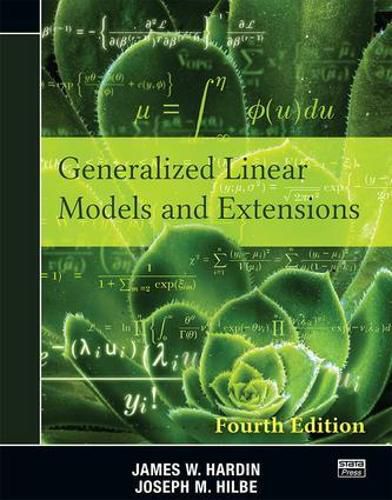Readings Newsletter
Become a Readings Member to make your shopping experience even easier.
Sign in or sign up for free!
You’re not far away from qualifying for FREE standard shipping within Australia
You’ve qualified for FREE standard shipping within Australia
The cart is loading…






Generalized linear models (GLMs) extend linear regression to models with a non-Gaussian, or even discrete, response. GLM theory is predicated on the exponential family of distributions-a class so rich that it includes the commonly used logit, probit, and Poisson models. Although one can fit these models in Stata by using specialized commands (for example, logit for logit models), fitting them as GLMs with Stata’s glm command offers some advantages. For example, model diagnostics may be calculated and interpreted similarly regardless of the assumed distribution.
This text thoroughly covers GLMs, both theoretically and computationally, with an emphasis on Stata. The theory consists of showing how the various GLMs are special cases of the exponential family, showing general properties of this family of distributions, and showing the derivation of maximum likelihood (ML) estimators and standard errors. Hardin and Hilbe show how iteratively reweighted least squares, another method of parameter estimation, are a consequence of ML estimation using Fisher scoring.
$9.00 standard shipping within Australia
FREE standard shipping within Australia for orders over $100.00
Express & International shipping calculated at checkout
Generalized linear models (GLMs) extend linear regression to models with a non-Gaussian, or even discrete, response. GLM theory is predicated on the exponential family of distributions-a class so rich that it includes the commonly used logit, probit, and Poisson models. Although one can fit these models in Stata by using specialized commands (for example, logit for logit models), fitting them as GLMs with Stata’s glm command offers some advantages. For example, model diagnostics may be calculated and interpreted similarly regardless of the assumed distribution.
This text thoroughly covers GLMs, both theoretically and computationally, with an emphasis on Stata. The theory consists of showing how the various GLMs are special cases of the exponential family, showing general properties of this family of distributions, and showing the derivation of maximum likelihood (ML) estimators and standard errors. Hardin and Hilbe show how iteratively reweighted least squares, another method of parameter estimation, are a consequence of ML estimation using Fisher scoring.